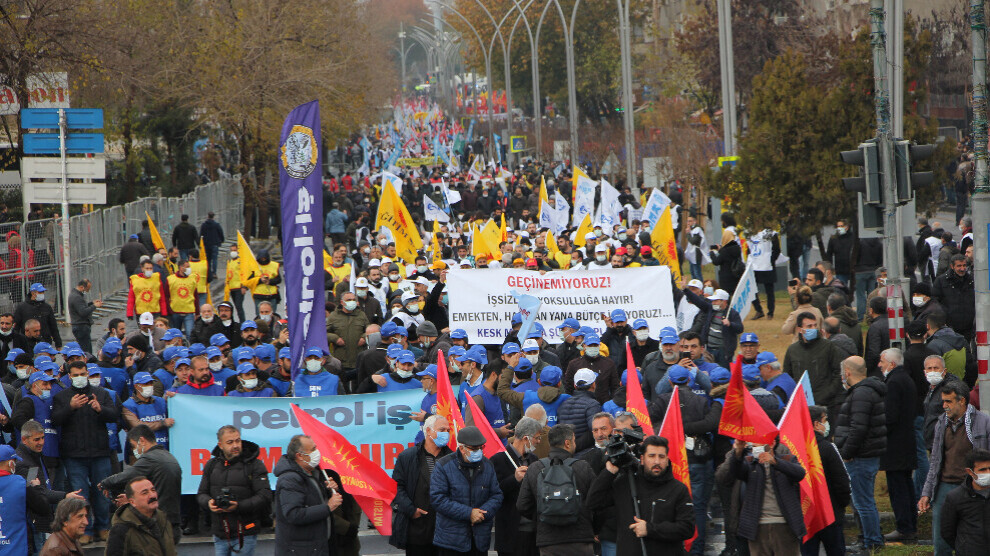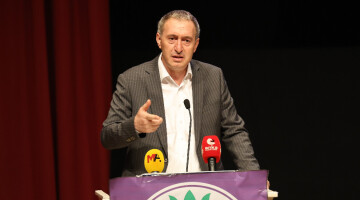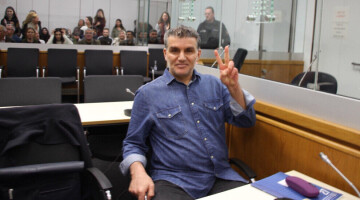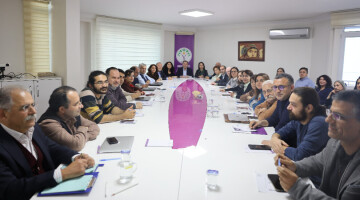In the Kurdish metropolis of Amed (tr. Diyarbakir), thousands of people followed the call of the umbrella organisation of left-wing public service unions (KESK) on Saturday to protest against poverty and the economic policies of President Recep Tayyip Erdoğan. "We can no longer provide for ourselves - shoulder to shoulder for a decent life, work and a people-oriented budget" was the central message of the demonstration. People from cities such as Urfa, Mardin, Şirnak, Batman, Siirt and Hakkari also participated in the event.
Together against the status quo
"We are all affected by the deterioration of living conditions and the imminent hyperinflation. We can only fight against all this if we stand together. We are here to show the need to act together against these conditions," said KESK spokesperson Nasır Demirkıran at the beginning of the rally. Several large and colourful blocks marched to the rally site at the train station square, showing the diversity of the participants which included the Turkish Medical Association (TTB), the Kurdish Free Women's Movement (TJA), the Kurdistan Communist Party (KKP), the HDP, ESP, EMEP as well as the DBP, the Peace Mothers Initiative and other civil society organisations which were all represented with their members to take their protest to the streets. Their demands were written on signs and banners: "Gender-equitable budget now!" and "Jin, Jiyan, Azadî" [Women, Life, Freedom] dominated the women's block, while civil rights associations demanded "Justice, Law". The groups in the democracy block demanded a "budget for the people instead of for the palace". The peace mothers saluted the resistance of political prisoners. Together, they repeatedly loudly demanded the resignation of the government.
"The people suffer, but the criminal palace regime continues to live in luxury"
"While the queues for subsidised bread are getting longer and longer, the palace rulers are pocketing more and more money," said KESK Co-Chair Şükran Kablan Yeşil. The trade unionist stressed that the economic and monetary crisis, for which the President himself is responsible, has produced an "unemployed army" that is growing by the day. "Millions of people in this country can no longer afford basic foodstuffs. The people are suffering, but the criminal palace regime continues to live in luxury. We will not accept this." Yeşil described the recent increase in the state minimum wage, which around 40 per cent of working people have to get by on, as "undignified" window dressing. It will rise from 2,825 to 4,250 liras from January. Whereas the current minimum wage was 380 dollars at the beginning of this year, the new one is now only 250 dollars. This shows that the wage increase proudly announced by Erdoğan as "the biggest in 50 years" will quickly fizzle out. It does not even compensate for this year's inflation, which is officially 21.3 per cent, but according to data from independent experts, it was 58.7 per cent in the previous month.
Yerlikaya: All crises anchored in the centre of the crisis of democracy and justice
Halis Yerlikaya, a doctor who belongs to the Central Council of the Turkish Medical Association, sees the economic crisis and every other threat to society and the country anchored in the "centre of the crisis of democracy and justice". "It is not only the economy that has been destroyed. It is clear, for example, that our health system could have coped better with the Corona pandemic if the elected mayors were still in office. But unfortunately, local democracy has been crushed as well as general democracy, so they are in prison or under house arrest," Yerlikaya stated. The health system has been destroyed by the government and its supporters, he said, and it is invested in nothing but war. "A government that lacks understanding of democracy and peace is the biggest threat to a society. Because hopelessness about the future quite often leaves social health irretrievable,” he added.












